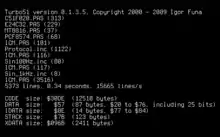Turbo51
Turbo51 is a compiler for the programming language Pascal, for the Intel MCS-51 (8051) family of microcontrollers. It features Borland Turbo Pascal 7 syntax, support for inline assembly code, source-level debugging, and optimizations, among others. The compiler is written in Object Pascal and produced with Delphi.
 Turbo51 command line output | |
| Developer(s) | Igor Funa |
|---|---|
| Stable release | 0.1.3.12
/ February 1, 2012 |
| Operating system | Win32 |
| Type | Compiler |
| License | Freeware |
| Website | turbo51 |
In the 1980s, Intel introduced the 8051 as the first member of the MCS-51 processor family. Today, hundreds of cheap derivatives are available from tens of manufacturers. This makes the architecture very interesting for professionals and hobbyists. It is surprising that this 8-bit architecture is still in use today, and is still so popular. Of all 8051 compilers, several widely used C compilers exist, but only a few Pascal compilers. Turbo51 is available as freeware and was created with the goal to make a Pascal compiler for MCS-51 processors that will be as fast as Turbo Pascal, will use the same syntax and will generate high quality optimized code.
Language dialect
Turbo51 uses Borland Turbo Pascal 7 dialect. The syntax was extended with some constructs to support specific features of MCS-51 processors.
Var RS485_TX: Boolean absolute P3.2;
I2C.SDA: Boolean absolute P3.7;
I2C.SCL: Boolean absolute P3.4;
EEPROM_Data: TEEPROM_Data XDATA absolute 0;
ModuleAddress: Byte;
RX_LedTimer: Byte;
TX_LedTimer: Byte;
SavedOutput: TOutputData IDATA;
OutputsAuxData: Array [1..8] of Byte IDATA;
Features
- Win32 console application
- Fast single pass optimizing compiler
- Borland Turbo Pascal 7 syntax
- Full floating point support
- Mixed Pascal and assembly programming
- Full use of register banks
- Advanced multi-pass optimizer
- Smart linker
- Generates compact high quality code
- Output formats: Binary, Intel HEX, OMF51 Object Module Format
- Assembly source code generation
"Hello World" example
Program HelloWorld;
Const
Osc = 22118400;
BaudRate = 19200;
BaudRateTimerValue = Byte (- Osc div 12 div 32 div BaudRate);
Var SerialPort: Text;
Procedure WriteToSerialPort; Assembler;
Asm
CLR TI
MOV SBUF, A
@WaitLoop:
JNB TI, @WaitLoop
end;
Procedure Init;
begin
TL1 := BaudRateTimerValue;
TH1 := BaudRateTimerValue;
TMOD := %00100001; { Timer1: no GATE, 8 bit timer, autoreload }
SCON := %01010000; { Serial Mode 1, Enable Reception }
TI := True; { Indicate TX ready }
TR1 := True; { Enable timer 1 }
Assign (SerialPort, WriteToSerialPort)
end;
begin
Init;
Writeln (SerialPort, 'Hello world!')
end.
